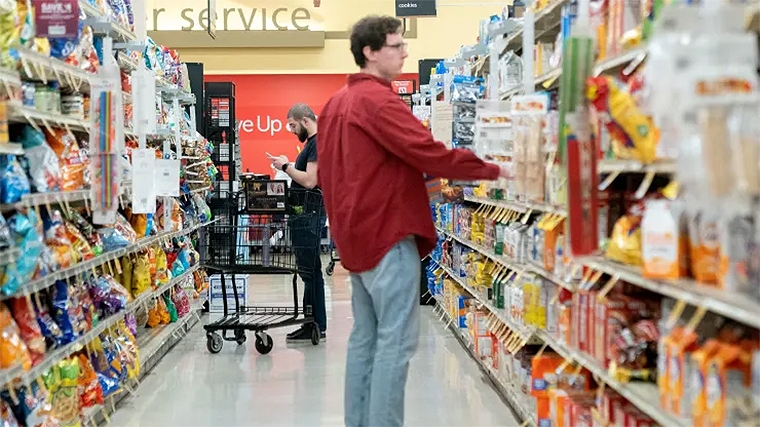
France’s finance minister has secured another deal to combat rising grocery prices for consumers, with firms such as multinational Unilever agreeing to cut prices on hundreds of products.
Finance Minister Bruno Le Maire said French shoppers would see lower prices from July, and has warned companies who fail to follow through may be hit with financial sanctions.
Le Maire said 75 food companies could be named and shamed to the public if they don’t live up to their promise. The firms are responsible for 80% of what the French eat, the minister said.
The minister said pasta, poultry and vegetable oil were some of the products on which prices will be decreased, but the cost of beef, pork and milk would not.
In March Le Maire reached agreement with retail groups for an “anti inflation” quarter, with retailers cutting prices for a wide range of foodstuffs "to the lowest possible level" until June.
Food prices have been rising in France, and in other European nations. Food inflation was 14.9% in France in April year-on-year, and food prices in the UK rose 19.1% for the same period, the second-highest increase in 45 years.
The UK is reportedly planning a voluntary cap on the price of basic food items such as milk and bread, similar to the earlier deal struck in France. Hungary has also tried to bring down the cost of food, introducing price caps on "staple foods".
In the European Union consumer food prices were on average almost 17% higher in April than a year earlier.
In New Zealand, Commerce Minister Duncan Webb said price caps were not a priority.
He said price caps may help address short-term affordability concerns, however, there could be unintended consequences including discouraging producers from supplying goods due to reduced profitability, stifling innovation, and lead to shortages or lower quality products in the long run.
Raewyn Bleakley, Chief Executive of the New Zealand Food and Grocery Council said freezing prices can cause challenges to any business, and the suppliers it represents are no different.
“Food and grocery suppliers are in a highly competitive environment and are constantly looking for efficiencies and having to balance many factors beyond their control. Setting the prices they sell their products at to retailers involves negotiation and it is entirely up to the retailers what they set the price that the products appear on the shelves at and consumers ultimately pay.”
Webb said his priority was addressing food-price inflation by tackling excess profits in supermarkets through the Grocery Industry Competition Bill.
The legislation includes forcing the current big two – cooperative Foodstuffs and Aussie-owned Woolworths – to open up wholesale networks to competitors at prices that could be set by a regulator if they don't make deals in good faith.
A grocery commissioner is also set to be appointed to oversee competition in the industry, with an appointment expected soon.
Statistics NZ's food price index rose 12.5% in the year ended April, the highest annual rate since late 1987.
The next Food Price Index will be released on June 14.
The latest Infometrics-Foodstuffs New Zealand Grocery Supplier Cost Index reported an 8.8% annual increase in what suppliers charged supermarkets for goods in May.
The index measures the change in the cost of 60,000 grocery goods charged by suppliers to the Foodstuffs North Island and South Island cooperatives.
9 Comments
Yay! Another top level bureaucrat appointed politically who will have deep ties to the industry that will basically work as their PR team for the industry they are supposed to be regulating. For reference, see RBNZ or most of the ComCom management.
So instead of changing our competition laws we appoint more bureaucrats. Great.
The Commerce Commission and the laws need an overhaul. Grocery, banking and construction.
Would you expect anything different from this Government? They are great at wasting public money, making announcements, promoting a woke agenda, and appointing more bureaucrats. Not so great at delivering actual results.
What is this person actually going to do? David Clark mooted the GC as the solution to high grocery prices but I cannot see how this could possibly be the case. I can understand the GC's role if the supermarkets breach the Fair Trading Act, which may well happen periodically but generally speaking this isn't a major issue - the supermarkets are well aware of fair trading legislation. There will be nothing the GC can do to stop relentless increases in prices. Simply put, it is not illegal to raise prices even to levels that generate obscene amounts of profit. Creation of the Grocery Commissioner seems like a classic case of poor problem definition.
Hey who cares who gets the job as long as it makes Chippy's mob look like they are onto it before the election!
Heads up. I bet it wont be a Raji Kumar from the local dairy owners society.
I think it might take more than the Grocery Commissioner to make Chippy's mob look like they are on to it before the election!
Speaking of competition I went out to check prices on showers and equipment.
Some smart arse at Fletchers has come up with the idea of not having shelf prices for plumbing supplies at Mico outlets.
Drive across town to an independent and guess what…..no shelf prices.
And we wonder why house prices are so bloody high.
I wont shed a tear when the industry organisations start crying when the work dries up.
Do they not legally have to advertise prices?
Try bunnings, or I bought a load from the UK. Methven nz tapware for instance is half the price if you buy it from the UK and ship it back

We welcome your comments below. If you are not already registered, please register to comment
Remember we welcome robust, respectful and insightful debate. We don't welcome abusive or defamatory comments and will de-register those repeatedly making such comments. Our current comment policy is here.